From Wyomia Tyus to Alysia Montano: The sportswomen who have been fighting for their rights from dawn of time


From the high jumper who refused to stand for the US anthem in 1959, to today’s issue-engaged football players, Shireen Ahmed traces activist sportswomen
Women athletes have a tremendous history as disrupters and resistors. Contrary to popular opinion, sportswomen taking a social or political stand is not a recent phenomenon. Sportswomen have been quietly – and not-so-quietly – fighting for their rights for decades. Arguably, for women, just engaging in sport has often been a radical act in itself.
Eroseanna “Rose” Robinson and Wyomia Tyus
Before John Carlos and Tommie Smith raised their fists on the podium at the 1968 Olympic Games in Mexico City, there was a high jumper from Chicago named Eroseanna “Rose” Robinson who refused to stand for the Star-Spangled Banner at the 1959 Pan Am Games. Her protest drew attention to racial inequality during the Civil Rights era.
At that time, black women were expected to be grateful for the opportunity to compete. But Robinson boycotted State Department trips, spoke out in the media about sport being used as a propaganda tool to combat accusations of racism from the Soviet Union, and refused to pay her taxes to a country that legislated racial oppression.
Within months, Robinson was sentenced to a year in prison for tax evasion over $380. During incarceration she went on hunger strike, an act that took such a toll on her body that she never again competed at a high level. But on her release she continued her work as a pacifist.
In 1968, Wyomia Tyus became the first athlete – male or female – to defend an Olympic 100-metre title. Few know of Tyus’s athletic legacy, even fewer know of her silent protest in Mexico City where she wore black shorts to compete – rather than the United States team uniform – in opposition to racial segregation.

The US women’s football team
Megan Rapinoe was the first white athlete to kneel during the US anthem in solidarity with Colin Kaepernick and the “Black Lives Matter” movement that sought to raise awareness of anti-blackness and police brutality. Rapinoe first knelt prior to a match for her club Seattle Reign FC in 2016, and for the US that same year against Thailand. In response, US Soccer instigated a policy obliging all players to stand for the anthem.
Rapinoe, an advocate for LGBT rights, adapted her protest by refusing to sing the anthem while she stood. “I know what it means to look at the flag and not have it protect all of your liberties,” she said.
A self-described “walking protest”, Rapinoe continued her silence during the recent World Cup and was met with a chorus of boos. Her comment that she would not visit “the f------ White House” because of President Trump’s racist and homophobic policies prompted a public rebuke from Trump. A vocal member of the collective of players suing their federation for equal pay, Rapinoe gave a speech after her team’s World Cup win reminding fans and her team-mates about their shared responsibility to make the world a better place.
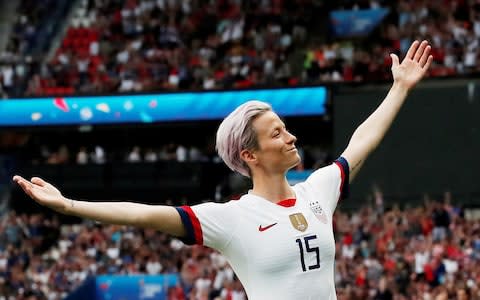
Ibtihaj Muhammad
Fencer Muhammad was the first hijab-wearing Olympian to represent the United States when she competed at the 2016 Games in Rio. After winning a bronze medal, Muhammad wrote an open letter to Donald Trump about how his treatment of the Muslim community, and refugees, was unjust, his actions harmful for the nation.
Days after sports chain Decathlon refused to stock hijabs for runners in its French stores, Muhammad tweeted that she would be wearing her hijab “every damn day”. Speaking exclusively to Telegraph Women’s Sport in Paris, she said: “I think that type of intentional, targeted alienation over and over and over can break someone. I refuse to let it break me. I want to motivate and encourage and inspire whoever is made to feel they don’t belong. To come to France, a place where it’s become super normal to discriminate against Muslims … I’m here to tell people that it’s not OK.

“When I look at my predecessors, like Muhammad Ali or [former NBA player] Mahmoud Abdul-Rauf, or [NFL player] Michael Bennett, [former NFL player] Colin Kaepernick, Megan Rapinoe, [WNBA player] Maya Moore, there are so many strong examples that I have as an athlete.
“Why not be on the right side of history? Why not fight and challenge every single injustice that exists, even if they don’t affect me? I don’t know if I’m always saying the right thing, but I know that not saying anything would be doing me a disservice.”
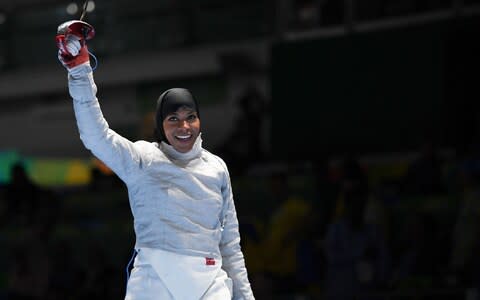
Serena Williams
Arguably the greatest tennis player of all time, Williams has been consistently targeted for racist and sexist abuse over her career. From a racist cartoon published in a newspaper, to the French Open changing the dress code to prevent her from wearing a body compression suit designed to help prevent blood clots after she nearly died following the birth of her child. This policing of black women’s bodies is the misogynoir that we see so often, an exercise in creating arbitrary and unnecessary rules.

Whether speaking about her journey as a black woman in sport, injustices in the healthcare system, or maternity rights and equal pay, Williams is clear on her role: “I’m a black woman, and I am in a sport that wasn’t really meant for black people.”
Despite the support of the likes of Billie Jean King and JK Rowling, Serena continues to be attacked – recently following her defeat by Simona Halep at Wimbledon when she was asked if her activism was a distraction. “The day I stop fighting for equality will be the day I’m in my grave,” she replied.
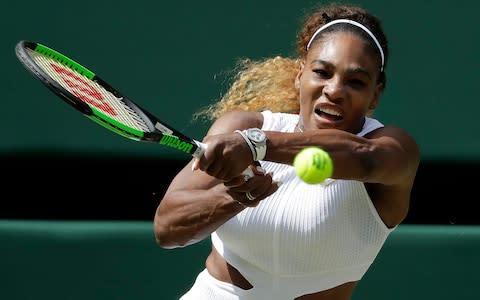
Caster Semenya
In a sport that supposedly fights to prevent its athletes from taking drugs, the International Association of Athletics Federations has seemingly done everything within its power to push Caster Semenya into taking medication in order to compete.
Semenya was unwillingly thrust into the limelight at 19 after winning the 800m world title. The IAAF has been accused of racism and human rights violations for pursuing a discriminatory policy against athletes with differences in sexual development (DSD), such as Semenya, who do not meet the governing body’s criteria of what it means to be a woman.
The science used by the IAAF to support their case has been widely condemned by experts. In response Semenya and her lawyers have fought the bans that continue to target her.
Born and raised as girls, Semenya and Indian sprinter Dutee Chand could never have imagined that their identities as black and brown gay women would be part of a discussion on sport in the world, that their bodies would be violated by invasive medical tests and “treatment”.
But while many have expressed support for the rights of DSD athletes, in May, the Court of Arbitration for Sport ruled against Semenya in a landmark case describing her ban as a “necessary discrimination”. Semenya has said that she will “never stop fighting”.
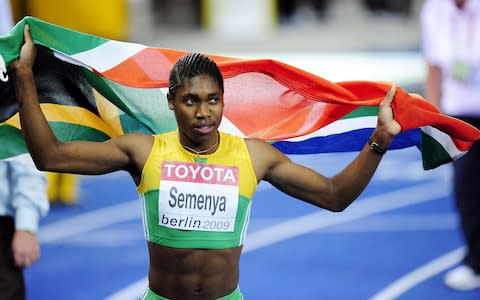
Alysia Montano
In 2014 Alysia Montano made global headlines when she competed at eight months pregnant at the US national trials. While some marvelled at her athletic prowess, others questioned the safety of her unborn child. Earlier this year Montano revealed the true reason – she needed the money. In a piece for The New York Times, Montano explained how her sponsor, Nike, the architect of female empowerment marketing campaigns such as #DreamCrazy, had been discriminating against athlete mothers behind the scenes.
Montano’s voice was joined by marathon runner Kara Goucher, who revealed that Nike refused to pay her following the birth of her child, forcing her to schedule a marathon just 3½ months post-partum. Allyson Felix, one of US track and field’s most feted athletes, also spoke up, saying that if someone with her credentials could not secure maternity rights, the outlook for other athletes was grim. Under pressure, Nike announced that it would now support women during and after pregnancy.

Ada Hegerberg and Eniola Aluko
This summer, the world’s most talented footballer, Hegerberg, boycotted the World Cup citing inequality in her national federation. Although Norway signed a first-of-its kind agreement in 2017 offering equal wages for men and women, Hegerberg says there is no full-time medical staff for the women’s teams and that the lack of resources has left her “mentally broken”.
Similarly, Aluko sacrificed a celebrated career with England when she spoke publicly about then England manager Mark Sampson racially abusing her and team-mate Drew Spence. In a case that dragged on for months, Aluko, a qualified solicitor, found her words echoed in an abyss of mismanagement with the Football Association eventually hauled in front of a parliamentary select committee for questioning. Sampson was eventually sacked – not for his bigoted jokes but for an “inappropriate relationship” with players at a previous job.
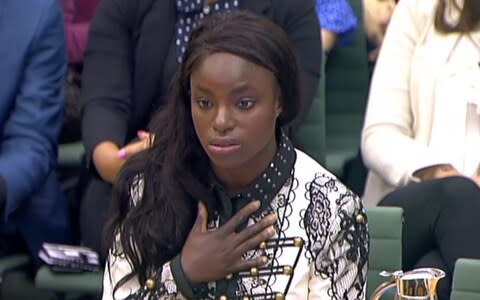
Like many women of colour activists, Aluko found herself alone when she complained. Despite using her legal skills to help her team-mates fight for better pay and maternity rights, when Aluko experienced discrimination first hand few of them publicly supported her.
“There is lots of talk about being the most together team in the world – I’ve truly never felt so isolated as I was in that team between 2014 and 2016,” she said.

 Yahoo Sport
Yahoo Sport 





































